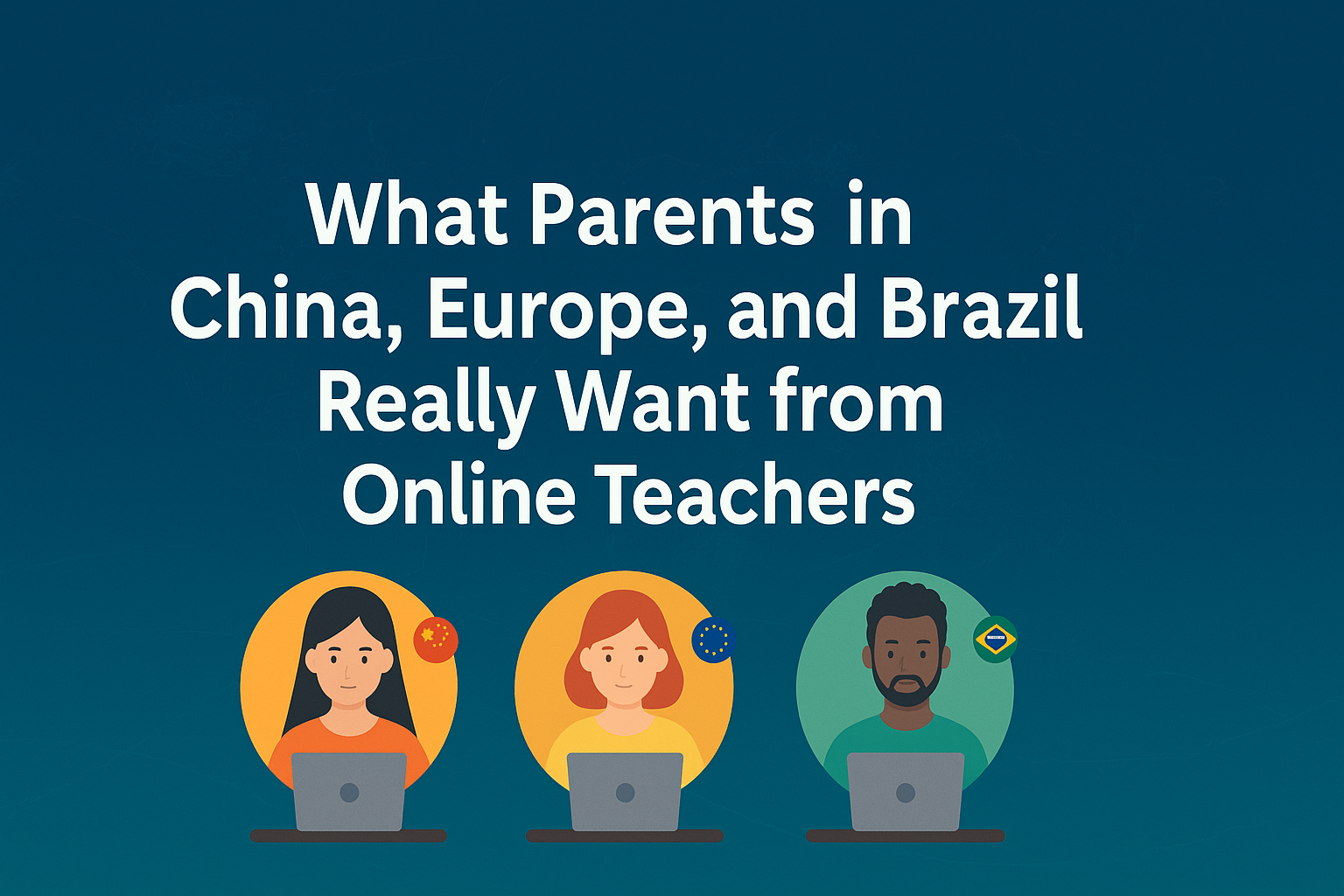Introduction
Ever wondered why some online teachers have fully booked schedules while others struggle to fill even one slot? The difference often comes down to one key factor: understanding what parents really want. If you’re teaching students from different parts of the world, you can’t take a one-size-fits-all approach. Parents in China, Europe, and Brazil have very different expectations, and knowing these nuances can make or break your success as an online teacher.
In this post, we’ll break down what parents in these three major markets truly value—so you can adapt your approach, build trust, and secure long-term students. Whether you’re new to international teaching or looking to refine your strategy, these insights will help you connect with families on a deeper level and stand out in a crowded online teaching space.
Why Cultural Insight Matters for Online Teachers
When you teach students from around the world, you’re not just teaching language—you’re bridging cultures. Every parent brings unique expectations shaped by their country’s education system, cultural values, and personal priorities. What works for a parent in China may not resonate with a family in Brazil, and understanding these differences is what turns a teacher from “just another tutor” into someone parents trust and recommend.
Cultural awareness allows you to:
- Build stronger relationships: Parents feel understood when you recognize their priorities.
- Retain students longer: Meeting cultural expectations leads to long-term student retention.
- Stand out in a crowded market: Few teachers take the time to adapt their approach—doing so sets you apart.
In short, understanding cultural nuances isn’t just nice to have—it’s essential if you want to thrive as an online teacher.
What Parents in China Want
Parents in China often approach online learning with a results-driven mindset. Education is highly competitive, and many families see English as a gateway to better academic and career opportunities. This means they expect structure, accountability, and visible progress.
Here’s what stands out most to Chinese parents:
- Structured, Goal-Oriented Lessons: They want clear learning paths and measurable outcomes. Preparing for exams like IELTS or improving school performance is often the goal.
- Professionalism: Punctuality, polished communication, and regular progress updates are non-negotiable. Many parents expect weekly feedback reports or WeChat updates.
- Authority in the Classroom: Teachers are viewed as experts. Parents want you to take the lead in designing lessons and confidently guiding their child.
- Homework, Practice & Prep Work: Assignments between classes, along with previewing upcoming class material, show you’re invested in their child’s success.
Example: A teacher who provides a detailed lesson plan, sends regular progress reports, and gives tailored homework will quickly earn a Chinese parent’s trust.
What Parents in Europe Want
Parents in Europe often prioritize balance and a well-rounded approach to education. While they value academic progress, they also want to ensure lessons are engaging and don’t overwhelm their children. Many prefer a collaborative relationship with the teacher, viewing themselves as partners in their child’s learning journey.
Here’s what stands out most to European parents:
- Balanced Lessons: A mix of academics and enjoyable, real-world application to keep learning stress-free and meaningful.
- Interactive & Creative Approach: Project-based learning, critical thinking exercises, and conversational practice are highly valued.
- Collaboration with Parents: European parents often appreciate being included in goal-setting and progress discussions.
- Student Autonomy: They want their children to develop independence and take ownership of their learning.
Example: A teacher who integrates project-based activities and encourages student-led discussions while maintaining open communication with parents will thrive with European families.
What Parents in Brazil Want
Parents in Brazil often value personal connection and the overall learning experience as much as academic outcomes. They want lessons to feel enjoyable and engaging, especially for younger children, and they appreciate when teachers show warmth and enthusiasm.
Here’s what stands out most to Brazilian parents:
- Warmth & Connection: Building genuine relationships with students and parents creates a sense of trust.
- Energetic & Fun Lessons: Lively, playful classes—especially using music, storytelling, and games—keep students motivated.
- Visible Value: Parents want to feel that lessons are worth the investment, making bundled lesson packages or loyalty discounts appealing.
- Cultural Relevance: Including Brazilian cultural references or using context that feels familiar can help strengthen engagement.
How to Meet These Expectations Without Burning Out
Meeting different cultural expectations doesn’t mean working around the clock. With the right systems, you can deliver what parents need without sacrificing your time or energy.
Practical strategies:
- Create a parent-friendly communication system: Use tools like WeChat, email newsletters, or a dedicated parent portal for updates.
- Repurpose your lessons: Design flexible lesson templates you can tweak for each market instead of starting from scratch every time.
- Automate where possible: Use scheduling tools, pre-written feedback templates, and progress trackers to cut down on admin work.
- Set boundaries: Be clear about response times, lesson policies, and what’s included in your services so you can provide value without overextending yourself.
By putting these systems in place, you can meet diverse expectations while keeping your workload sustainable.
Use pre-made curriculum to lighten your load: There are excellent resources that already include the extras parents love. Florentis Learning offers homework, flashcards, and games that make classes interactive. Abridge Academy provides lesson previews so parents and students know what’s coming next. Young Learners Curriculum includes ready-made games and stories to keep lessons engaging. All three platforms also provide templates for giving lesson feedback, saving you time while keeping parents informed.
Final Takeaways & Next Steps
Understanding what parents in China, Europe, and Brazil want is about more than just teaching English—it’s about building trust and delivering value in ways that align with their priorities. Chinese parents expect structure, professionalism, and visible results. European parents want balanced, collaborative, and creative learning experiences. Brazilian parents look for warmth, fun, and culturally relevant engagement.
When you adapt your approach to meet these needs, you stand out from the crowd and build lasting relationships with families.
Your next step: Review your current teaching practices. Which of these cultural expectations are you already meeting? Which could you incorporate with minimal effort? Start small—maybe by adding weekly parent updates or introducing fun cultural elements—and watch how it transforms your student retention and parent satisfaction.
Want more strategies for growing your teaching business? Join the Teacher Boss Society for weekly coaching and proven systems to help you fill your schedule without the stress.


Leave a Reply